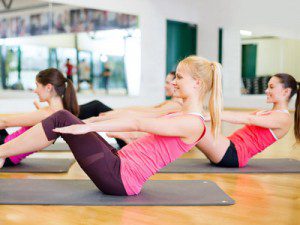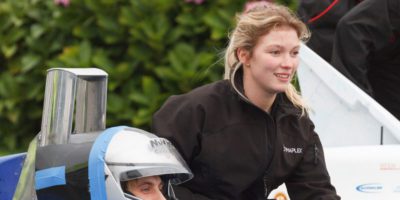Lisa O’Keefe is Director of Insight at Sport England, having joined the organisation in 2000. Lisa is a former Scottish rugby international with a long and varied career in sport, having also worked for the Women’s Sports Foundation and the National Coaching Foundation. On the rugby field, she won 45 Scotland international rugby caps between 1994 and 2006 and competed in two World Cups, one European championship and numerous Six Nations.

“…There are currently 15.5m adults in England playing sport on a weekly basis, an increase of 1.5m since 2005/6, but we still have a big job to do…”
Lisa, your CV is fantastic. Please can you tell us about how you got to where you are today?
I didn’t have a plan but on reflection I suspect I have benefited from four things of which the most important (whether at work or on the sport field), is a desire to do a good job. This combined with attention to detail, making the most of opportunities and a dose of good fortune has allowed me to progress in my career.
I started my career in the financial sector learning the importance of sound investment for returns. The principles which I learnt at that time have stood me in good stead during my time at Sport England where we are investing significant amounts of public money for sporting outcomes.
It was never my intention to work in the sports sector and I suspect I wouldn’t be today had I not snapped the ligaments in my knee during an end of season social rugby tournament. It was having resigned from my career in stockbroking to focus upon my rehabilitation that I enrolled on a Masters Degree in Sport and Leisure Policy at Edinburgh University simply to keep my brain ticking over, a move which ultimately resulted in a switch from the financial to sport sector.
Although I didn’t immediately recognise it, a spot of bad luck created the opportunity and good fortune that led to a rewarding career change.
Where did your love of sport begin?
There was not a single moment that sparked an interest or love of sport, although I can say that I came from a supportive environment where my parents and friends encouraged me to try all sports.
Rugby was something that I watched rather than played and it was a chance encounter that provided me with the opportunity to give it a go.
It was just after I started going to university, my father and I were watching Edinburgh Academicals play Heriots in the men’s Scottish Premiership League fixture. We were standing in the clubhouse looking out onto the pitch at half time and we saw a group of women over in the far corner throwing a rugby ball around and doing some training.
My father was looking at them absolutely transfixed and I thought, “What is he going to say?” And he turned round and he said, “You could do that.” I must admit my immediate reaction was, “Er, no!”, but with a little persuasion from my father I was back down at Edinburgh Academicals the following week. I introduced myself, jumped in and gave it a go, and the rest is history.
A women’s rugby international is about as far away from a female stereotype as you can get! How did people react to you as a female rugby player?
It’s interesting. Its important to remember, I started playing rugby in the early 1990s, so women’s rugby (which has a fairly good profile now, thanks largely to the tremendous success of the England Women’s team) was a relatively new sport.
I would say that people’s reactions ranged from intrigued to disapproving and everything else in between.
Scottish Women’s Rugby did however benefit in 1994 from the decision of the Dutch Rugby Union to pull out of hosting the Women’s Rugby World Cup with 90 days to go. Amazingly, a group of players (largely from Edinburgh Academicals), decided that they could step in and host the tournament themselves, and that’s exactly what they did.
They secured support from sponsors, venues and importantly the competitors to host a Scottish based tournament with the final between England and the USA broadcast live by the BBC. The coverage of the tournament and the response of players to the threat of losing the event attracted significant media coverage, and did much to boost the profile and support for the women’s game in both Scotland and England.
Please can you tell us about the remit of Sport England?
Sport England is responsible for helping people and communities across England create sporting habits for life. This means investing in organisations and projects that will get more people playing sport (and by that I mean all people at all levels) and creating opportunities for people to excel at their chosen sport.
There are currently 15.5m adults in England playing sport on a weekly basis, an increase of 1.5m since 2005/6, but we still have a big job to do. The number of young people playing sport remains flat and we continue to see a gender gap with 8.6m men playing sport weekly compared to 6.8m women.
Playing sport regularly in England remains a minority activity with the majority of the population dipping in or out or choosing not to play at all. The challenge for Sport England and the sector as a whole is to understand what drives and motivates people, and what (if anything) will encourage people to build a regular sporting habit into their life.
In addition to investing to grow the numbers playing sport, we invest about 25% of our funds to develop talent. Investing to develop sporting talent is important to us because not only do we want to feed athletes up into the Olympic and Paralympic programmes funded by UK Sport, we also want to ensure that competitive club sport has a real backbone of good quality players, who’ve had good coaching, played at a good standard of competition and frankly, have a good experience from playing that sport.
How do you get across to people the breadth of new sports they can try? Did the Olympics help with this?
It did. The Olympics and Paralympics are fantastic because they act as a shop window for so many of the ‘smaller’ sports that we often don’t see in the media. One of the best moments for me of the Olympics and Paralympics was watching the nation realise just how good we are at many of these sports.
The individual National Governing Bodies of Sport for each sport work hard to promote opportunities to play, and at Sport England we use Twitter feed and our ‘Be Inspired! newletter to promote a whole range of opportunities within local communities to give sport a go. We also work in partnership with organisations such as the BBC, who are also committed to promoting opportunities to take part for those inspired by the success of our sportsmen and women.
What does your current role involve? What sort of things are you doing to help?
There isn’t a typical day, but that’s what’s great about it. My role is about making sure that in the first instance my organisation has a really good view of what’s happening in the world of community sport. So, how many people are playing sport, what sports and how often. We carry out a survey, called ‘Active People’. We call 165,000 people every year and ask them exactly that. We then make that data freely available on the Sport England website so that the whole sector can benefit from that knowledge.
Of course understanding what people do is only part of the picture, the trick is understanding why or in the case of many people, why not! Understanding people’s behaviours, attitudes and motivations and importantly, finding ways of creating behavioural change is what my job is all about.
In most professional sports, there’s still a disparity between the salaries paid to women and men, with less women able to compete as professionals. How is this changing?
The first thing we have to remember is the number of people who are professional sports people, whether they are men or women, is quite small in this country. There are very few big commercial sports paying players, rugby union, rugby league, football, and cricket would fall into that category.
If we look beyond the big commercial sports, we have one big advantage in this country and that is the National Lottery. The National Lottery has allowed this country to invest not only in community sport, but in the programmes to develop our elite athletes in the Olympic and Paralympic sports.
As a direct result of this investment from UK Sport, sportsmen and women are able to train full time and achieve unprecedented levels of elite success regardless of gender. Indeed, it was many of the female athletes at both London and Sochi that secured the gold medals for Team GB.
Turning back to big commercial sports, it is pleasing to see the way that the National Governing Bodies of cricket, football and rugby have taken on responsibility for funding the women’s elite programmes, and this year the England and Wales Cricket Board announced investment that will allow England to have a full-time professional women’s cricket team.
This is great news in the year that their captain Charlotte Edwards became only the second woman to be names as one of Wisden’s Five Cricketers of the Year.
Are we still feeling the benefits of the Olympic / Paralympic legacy in Britain?
Yes, I think we are. Obviously there’s not the same euphoria that we had immediately post the Olympics and Paralympics, but we continue to see more and more people taking up sport, and importantly, many of the smaller Olympic and Paralympic sports have experienced increased interest and numbers taking part.
Our challenge is to keep this momentum going, and through working with partners such as UK Sport and the National Governing Bodies of Sport who continue to bid for major events in this country, we have continued opportunity to nudge people to try or get back into sports.
The arrival for example of the Tour de France to these shores in the summer could be a real shot in the arm for the work of British Cycling and others to grow the numbers of people regularly getting out on their bike, and I know that there are many festivals and events planned to give people the opportunity, confidence and motivation to give it a go.
Sport England is investing £1.2 billion in projects and organisations all across England to provide the population as a whole with the opportunity to take up the sport of their choice, and to build upon the momentum generated by the Games in London.
In Canadian ice hockey, Olympic gold medal winner Shannon Szabados plays in the men’s league. Do you think anything like that ever will happen here?
I think there’s a couple of different levels here. First of all in terms of community sport, and in particular a lot of the recreational sports, so thinking about the touch rugby and some of those more informal sports, then absolutely. It’s about having good fun with your mates, and a lot of those sports lend themselves to be played in a mixed environment.
That’s a really good way to encourage people to pay sport and get into that sporting habit. When it comes to more of the competitive side, it’s not quite so straightforward, but in some cases you do see examples of women who make that transition.
The current England women’s wicket keeper, Sarah Taylor, plays for the Sussex men’s side, so there are some sports where actually, there’s not going to be a physical difference that’s going to prevent women from doing that.
I think what’s really important is that people have the same opportunity to play sport in a way that’s right for them and for some women that will mean in a mixed environment. For others, it won’t. As long as they’re got good quality opportunity at the right level for them, so that they are both motivated and inspired to play and retain that sporting habit, that’s what we’re looking for.
Where do you sit in relation to the debate about ‘girly’ sports and activities versus competitive sports?
There are lots of labels and terms banded around when it comes to sport, many of which I don’t agree with, but what I do know for sure is that success comes from offering choice.
There are some women who will absolutely want a competitive environment and to be driven by that, will want to join a club, will want to try and get into the first team, the county side, the regional side. They will want to play international sport. I understand that and it’s important that Sport England plays its part in helping that to side of sport to thrive.
There will be some women for whom the motivation and desired experience is very different. They may be seeking a more social experience, opportunity for personal improvement and improved wellbeing. That’s equally valid and it is vitally important that the ‘sports sector’ understands and delivers the right experience for this market.
Finally, what is next for Sport England?
As you would expect, we have a lot on. We are continuing to manage our investments across the country and through doing so, building our understanding of sports consumption and provision.
We are also continuing our programme of new investment including £18m of National Lottery improve primary school sports facilities, a £5m Flood Relief Fund for sports facilities damaged as a result of the recent floods and storms, and a further £8m into projects providing more opportunities for disabled people to play sport, to name but a few.
Full details on the Sport England website!
https://twitter.com/Sport_England
https://www.facebook.com/sportengland
https://www.sportengland.org/sport-you/be-inspired/








